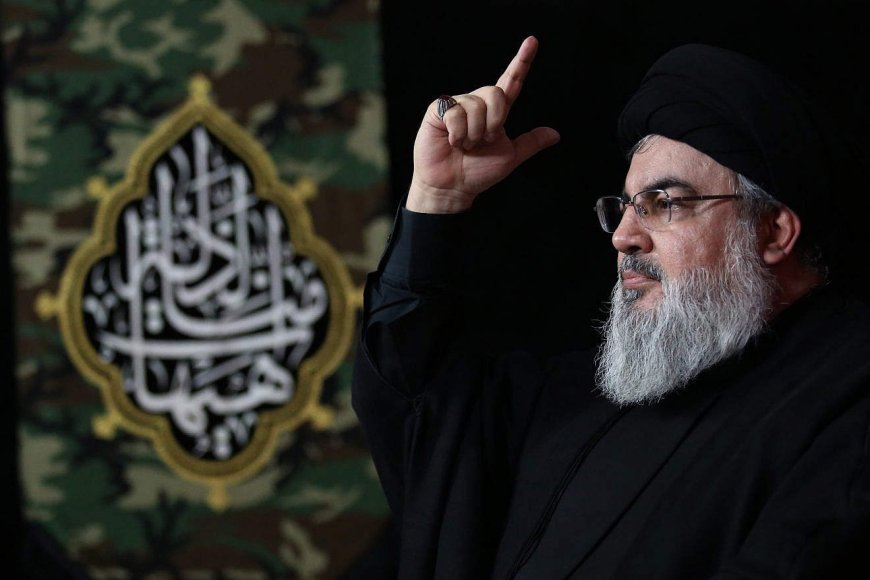Nasrallah’s Legacy: The Death of a Leader, the Birth of a Thousand More

By: H. Zaïm-Bashi
The victory of 1979 Islamic Revolution in Iran heralded a profound shift in the geopolitical landscape of the Middle East giving birth to an ideology that would redefine the contours of resistance against imperialism. Rooted in defiance of US hegemony this ideological awakening crystallized a new order among Islamic nation—a collective identity coalescing around the concept of the Ummah and the noble quest of renewing Islamic civilization. This Iran-led movement now known as the "Axis of Resistance" transcended the political and geographical boundaries of statehood bringing together state and non-state actors united in their commitment to resist oppression and dismantle tyranny.
At the core of this Axis lies an indomitable coalition of sovereign actors—principally Iran Syria Iraq and Yemen—alongside influential non-state entities such as Hezbollah Hamas and the Palestinian Islamic Jihad. Together they embody a formidable resistance front driven by a shared geopolitical strategic and ideological mission: to confront American imperial dominance to vanquish the occupying Israeli regime and to foil the complicity of certain reactionary Arab regimes. The Axis of Resistance is not merely a political or military alliance; rather it is the manifestation of a higher calling—an alliance of conscience and conviction.
This movement draws its strength from an expansive vision of human dignity and spiritual awakening. In the worldview of the Islamic resistance individuals are seen as the inheritors of a divine mandate tasked with embodying the ideals of justice and civilizational advancement. Martyrs-- such as General Qasem Soleimani Sheikh Ahmed Yassin Fathi Shaghaghi and Sayyed Abbas Mousavi to name but a few-- have emerged from every corner of this expansive geography. Their sacrifices are not confined to nationality but represent the shared ethos of Islamic resistance. From the defenders of the holy Islamic shrine in Syria to the Palestinian martyrs in Gaza their blood cements the unity of the Axis of Resistance transcending borders to forge an unassailable bond rooted in faith justice and defiance of tyranny.
Today this broad movement has forged a collective understanding of the existential threat posed by Zionism and its Western patrons. This common awareness has bolstered the ideological solidarity that now shapes the geopolitical landscape of the region. The Axis of Resistance has proven itself to be not merely an ideological force but an indispensable player with the capacity to alter the balance of power in the Middle East and beyond. As Iran’s Supreme Leader Ayatollah Imam Khamenei has eloquently observed "The fate of this region will be determined by the forces of resistance with Hezbollah standing as its proud and valiant vanguard."
The ideological tenets of the Islamic resistance are deeply rooted in the rich spiritual heritage of Islam. It is an ideology that transcends the charisma of any one leader or the fleeting power of any political figure. Rather it is founded upon timeless principles drawn from the teachings of the Holy Prophet of Islam [PBUH]—principles of steadfast opposition to tyranny the relentless struggle against the forces of imperialism and the unyielding defense of the oppressed masses. Martyrdom within this context is not a defeat but the ultimate expression of divine duty—a gateway to eternal honor and spiritual ascension.
Hezbollah under the leadership of Martyr Sayyed Hassan Nasrallah stood as a beacon of this ideological path. Nasrallah’s towering presence and political brilliance have struck fear into the hearts of the Israeli oppressors galvanizing the forces of resistance not only in Lebanon but across the globe. Yet Hezbollah’s strength does not rest solely on Nasrallah’s leadership; it is an organic manifestation of the collective will of the people imbued with the values of sacrifice and unwavering faith in the divine promise of victory.
Central to Hezbollah’s mission is its unshakable commitment to the Palestinian cause. From providing military support to Palestinian resistance in Gaza to directly confronting the Israeli enemy Hezbollah has positioned itself as the formidable actor in the broader struggle for Palestinian liberation. Its actions especially in the aftermath of the events of October 7 2023 demonstrate its unparalleled capacity to unify and lead the forces of resistance against the illegitimate apartheid regime of Israel. As history will record the downfall of Israel is inexorably tied to the unequivocal determination of the Axis of Resistance with Hezbollah playing a pivotal role.
Ultimately the ideology of resistance reveals to mankind the inherent dignity of the divinely ordained civilization—the role of human beings as agents of justice and societal renewal. Those who embrace this path are not only charting a course for their own spiritual growth but are also architects of a new just world order. By cultivating virtues such as courage and self-sacrifice these resistance fighters redefine the future of their societies. The martyrdom of leaders like Sayyed Hassan Nasrallah does not mark an end but a continuation of this sacred mission. His blood like the blood of those before him would nourish the Islamic resistance ensuring the proliferation of countless others dedicated to the eternal struggle against oppression.
In this worldview martyrdom is not the culmination of a life lived in resistance but a gateway a new stage of spiritual maturity—an elevation into the eternal realm where the martyr’s legacy continues to inspire future generations. The Axis of Resistance with its martyrs leaders and ideologues will forever stand as incarnation of a civilization built on the timeless principles of justice and divine purpose. The struggle endures and with it the promise of a new dawn free from the shackles of Zionist-American tyranny.













































